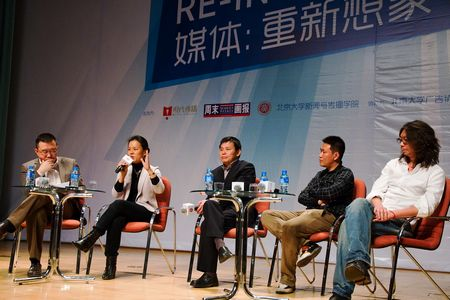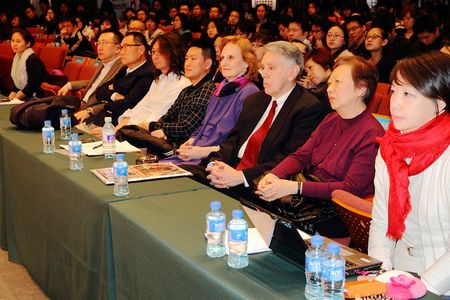News & Events | About PKU News | Contact | Site Search
Peking University, Mar. 28, 2011: "There is nothing new under the sun, but the sun is new every day,” said He Li, a senior financial news reporter on what is happening to media during a seminar at Peking University.
Newsmakers from the mediasphere and the academics gathered together at PKU Hall on March 25 to talk about new media. The event with the theme of "Media: Re-invented” was sponsored by the School of Journalism and Communication (SJC), and it was the first of the series to celebrate SJC’s 10th anniversary.
The speeches and subsequent roundtable discussion covered topics such as the changes new media brought and the measures traditional media should take to deal with the challenges.


Guests and the audience (PKU News/Wang Hanyu and Zhang Pan)
What do new media bring?
Professor Xu Hong, executive deputy dean of SJC, concluded the changes in general. "First, new media change the pattern of discourse power. The new media has become a significant field for public opinions, apart from the traditional media. Second, new media change the ecology of language. Now, the discourse of ordinary people challenges that of authorities. Third, new media change the structure of social interaction. The interaction was based on a center of information with the widespread usage of Google; now, however, the center is turning to the side of ordinary people, who are usually facebook and twitter followers."
Yang Ruichun, executive editor-in-chief of China Newsweek held that the world became “flat and fair” with new media, which lowered the threshold of broadcasting information. "What's more, new media consolidate the relationship among different people. For example, I have just found two friends not having contacted with for almost 10 years through micro-blog," said Yang.
Xu Zhiyuan, a PKU alumnus, columnist, and publisher at the Modern Media Group, revealed his attitude toward the influence of new media in pushing forward democracy. "I am not very optimistic about the influence. We cannot live in a world filled up only with facts. Ordinary people have the advantage of quantity and they just form an instant power which often dies out quickly. Their efforts, and sometimes even pure hype, do attract the attention of decision-makers; however, there is still a long way to go, as it is institutions that are more powerful in durative attention than individual people."
What will the future be like?
"Will there be fewer and fewer journalists in the future because everyone can disclose information and publish news?" A student asked during the Q&A session.
"No, but it will be just the opposite,” answered Cheng Yizhong, one of the best noted practitioners of Chinese journalism, laureate of the 2005 UNESCO/Guillermo Cano World Press Freedom Prize, and executive publisher of Asian Business Leaders. "With the rapid development of new media, an increasing number of audiences are created and cultivated. There will be more possibilities to consume the information, making the media industry more prosperous."
Traditional media today
Almost all guest speakers held the opinions that traditional media and new media would cooperate with each other and neither side would disappear. Shao Zhong, president of the Modern Media Group said: "With the help of new media, we traditional media have new opportunities and more room to develop. With the emergence of new media, creative people with rich imagination can survive and help traditional media better handle the challenges."
New media and traditional media should not be incompatible with each other, either, said Cheng Yizhong. "It is never an end of the traditional media; they haven't accomplished their mission yet."
Reported by: Chen Meng
Edited by: Jacques